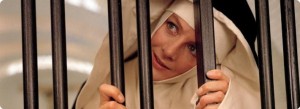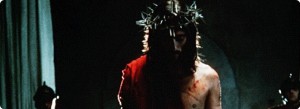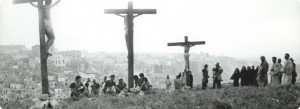Christianity, Controversy, Cinema
-
Burgess Foundation
- 17th April 2014
-
category
- Blog Posts
‘If it was suddenly revealed to me that it was true, that there was a hell and a heaven, I wouldn’t be surprised.’ – Anthony Burgess
Films that engage with Christianity often prove highly controversial. Christianity, Controversy, Cinema, a collaboration between the Burgess Foundation and the Cornerhouse cinema, revisits a number of works that still spark debate, even when they offer what seems to be a sympathetic portrayal of Christ and Christianity.
Anthony Burgess’s Catholic upbringing and later apostasy greatly influenced his work. The first film in the season is Jesus of Nazareth (1977), which was scripted by Burgess for Franco Zeffirelli. This is a rare, and possibly unique, opportunity to see the full six-hour epic on the big screen. Controversial in its time for its portrayal of Jesus as an ordinary and fallible man, Robert Powell’s nuanced performance retains the power to move, whatever your beliefs. With an introduction by Andrew Biswell. 19 April, 12 noon. Tickets here.
Also showing is The Last Temptation of Christ (1988). Martin Scorsese and Paul Schrader’s adaptation of Nikos Kazantzakis’ novel caused great controversry due to the film’s clear departure from the gospels. Most of the vitriol was saved for the film’s suggestion of a physical relationship between Willem Dafoe’s self-doubting, reflective Jesus and Mary Magdalene. On television and in print, Anthony Burgess defended Scorsese’s right as a creative artist to offend, and whether heretical or philosophically engaged, this is a film that still demands attention and debate. 28 April, 17:20. Tickets here.
The third in the season is The Gospel According to St. Matthew (Il Vangelo secondo Matteo) (1964). Given that its director is Pier Paolo Pasolini, perhaps the most controversial thing about The Gospel According to St. Matthew is its serious minded and somewhat sympathetic portrayal of Jesus. Using techniques drawn from neo-realism, Paolo presents Jesus as a man of the people who strove to change the world for the better of all. 19 May, 17:40. Tickets here.
The Devils (1971) concludes the series. Putting Ken Russell and Christianity together was bound to create interesting results, and so it proved with this disturbingly violent, sexually-charged film based on Aldous Huxley’s The Devils of Loudun and John Whiting’s The Devils. The film gives a dramatised account of the rise and fall of Urbain Grandier, a 17th-century priest executed for witchcraft. Notoriously troublesome for UK censors, The Devils retains its ability to shock and intrigue in equal measure. This film is preceded by an introduction from Dr Sian Barber, whose publications include Censoring the 1970s: The BBFC and the Decade that Taste Forgot. 2 June, 18:00 (introductory talk at 17:00). Tickets here.







